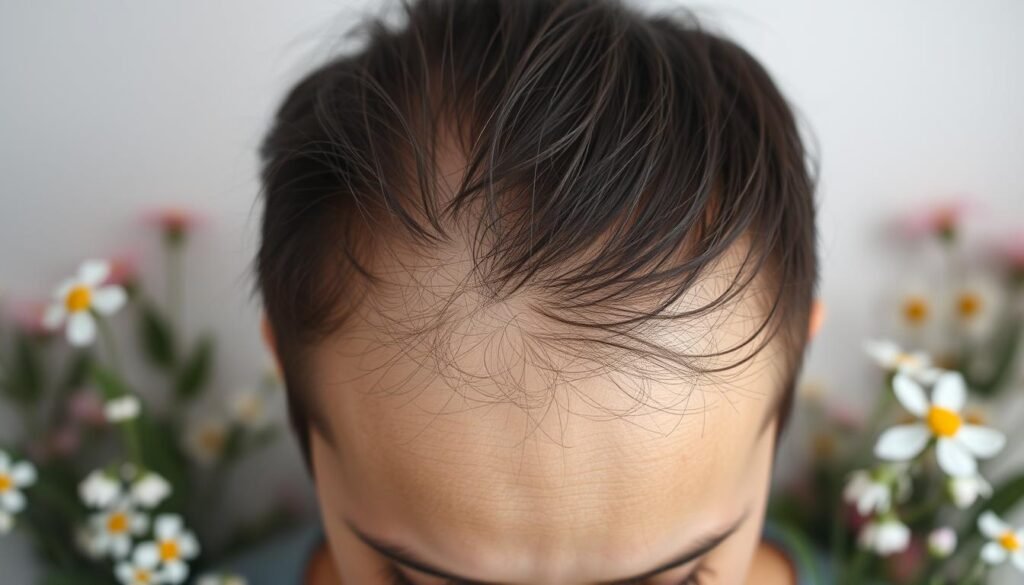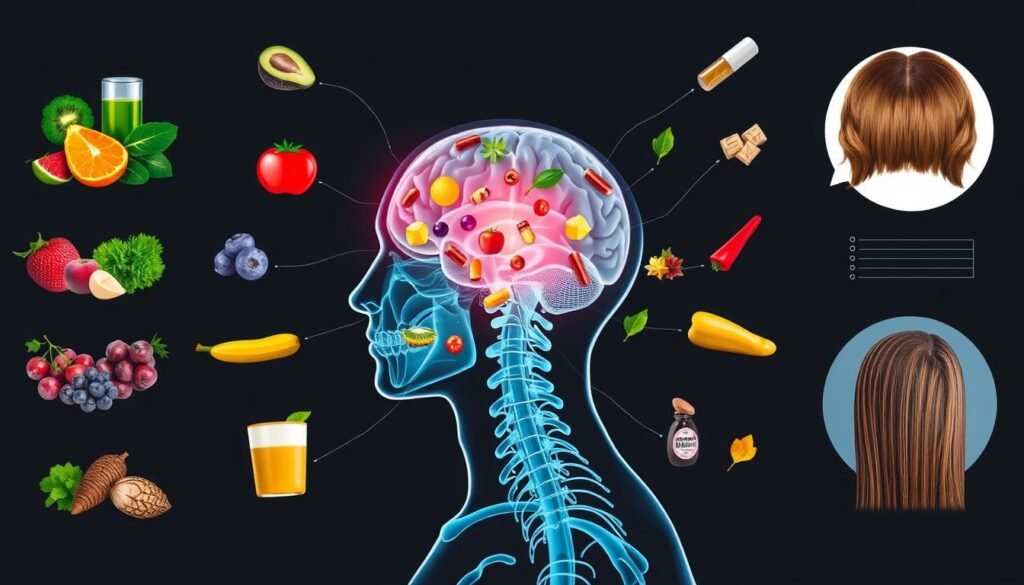Imagine this: around 50 million men and 30 million women in the U.S. are fighting hair loss. This fact shows how widespread alopecia is. It’s crucial to get to the bottom of what causes this condition. Looking into the root causes of Alopecia means figuring out a mix of reasons. These include genetic issues, autoimmune diseases, stress, poor nutrition, hormone changes, and certain medications. By understanding these factors, people can find better ways to treat Alopecia and avoid common triggers of hair loss.
Key Takeaways
- Alopecia affects millions, emphasizing the need to understand its causes.
- Genetic factors often play a significant role in hair loss.
- Autoimmune conditions can lead to unexpected hair loss.
- Stress can also be a contributing factor for many individuals.
- Nutritional deficiencies may severely affect hair health.
- Hormonal imbalances are common hair loss triggers.
- Recognizing medication side effects can help manage hair loss.
Introduction to Alopecia and Hair Loss
Alopecia is a term for many types of hair loss. It hits millions of people across the globe, no matter their age or sex. This lasting condition deeply affects both mind and body, pushing many to seek Alopecia Diagnosis with the first signs of hair changes.
Digging into the causes of Hair Loss is key for handling it right. Common causes are genetics, hormones, stress, and not getting enough nutrients. Knowing these can help figure out the condition and guide the treatment to what works best for each person.
Studies tell us about 40 million Americans are dealing with hair loss. This big number shows how critical it is to spread knowledge and understanding about alopecia.
Getting a professional look at alopecia makes a huge difference for those dealing with it. Whether it’s learning about treatment options or making changes in your life, being informed lets people tackle their hair loss more effectively.
Understanding the Root Causes of Alopecia
Alopecia causes hair loss for people of all ages and genders. The main types are androgenetic alopecia, known as male or female pattern baldness, and alopecia areata, which is an autoimmune condition leading to patchy hair loss. Telogen effluvium is also important, causing temporary hair loss from stress or hormonal changes. It’s vital to know these types to treat and manage the condition well.
Defining Alopecia
Understanding alopecia’s different forms is key. Each type has its own features, causes, and symptoms. Androgenetic alopecia usually comes from genetics and changes hair over time. In contrast, alopecia areata can start suddenly and hair may grow back without warning. Learning about these can give deeper insight into alopecia. Check out more at Understanding the Root Causes of Alopecia.
The Importance of Identifying Root Causes
Finding the root causes of alopecia is crucial for the right treatment. Hair loss varies greatly due to genetics, stress, or health issues. Knowing the exact cause helps doctors create specific treatment plans, improving outcomes for patients. This approach often includes medicine and changes in lifestyle. This focus helps people actively manage their health, leading to better recovery chances. For further details, visit Understanding the Root Causes of Alopecia.
Genetic Factors in Alopecia
Understanding how genetics affect alopecia is key. It’s known that if your family has a history of hair loss, you may too. This insight helps shape effective treatments and management strategies.
Family History and Heredity
Hair loss often runs in families, showing a genetic link. If your parents or siblings have hair loss, you might face it as well. This includes patterns seen in both men and women, linked to gene variations that impact hair growth.
Common Genetic Patterns in Hair Loss
Many genetic factors play a role in hair loss. Certain genes increase the risk of androgenetic alopecia. Studies show these patterns vary widely, pointing to genetics as a key factor in hair health.
| Genetic Marker | Effect | Demographic Variability |
|---|---|---|
| AR Gene | Influences androgen sensitivity, contributing to male pattern baldness | Higher prevalence in males |
| EDAR Gene | Affects hair follicle development | Variation across ethnicities |
| FGF5 Gene | Controls hair growth cycle duration | Common in various populations |
Autoimmune Hair Loss
Autoimmune hair loss happens when your immune system wrongly attacks hair follicles, causing hair to fall out. This is often called alopecia areata, which leads to sudden bald patches. Scientists are still figuring out why it happens, but genes and environment might influence it.
What is Autoimmune Hair Loss?
This type of hair loss shows that the immune system and hair growth are connected in complex ways. Alopecia areata is well-known and usually causes round, bald spots. Some people might lose all the hair on their scalp or their entire body.
Conditions Associated with Autoimmune Hair Loss
- Thyroid Disorders: Issues like hypothyroidism and hyperthyroidism can affect your hair and start an autoimmune reaction.
- Vitiligo: A condition where skin loses its color, which can happen alongside autoimmune hair loss.
- Other Autoimmune Disorders: Diseases such as lupus and rheumatoid arthritis can also lead to alopecia areata.
Diagnosis and Treatment Approaches
Doctors diagnose alopecia by looking at your medical history and examining your skin. They might also do blood tests. There are new treatments available, from corticosteroids to advanced therapies, that target the immune system.

| Diagnosis Method | Description |
|---|---|
| Skin Examination | A visual check for hair loss on the scalp and skin. |
| Blood Tests | Looking for other autoimmune diseases and hormone issues. |
| Biopsy | Sometimes, a small piece of scalp is tested under a microscope. |
Stress and Hair Loss
To understand how stress causes hair loss, we must look at various stressors. Life’s big changes, illnesses, and the environment can deeply affect us. This link between stress and hair health shows in conditions like telogen effluvium. In telogen effluvium, hair starts to fall out too soon.
Types of Stressors Affecting Hair Health
Stress affects hair in many ways. It can be emotional, from losing someone or work stress. Or it can be physical, from being sick or having surgery. Environmental factors like pollution or harsh weather also play a role.
- Emotional Stress: Life events such as the loss of a loved one or job-related pressure.
- Physical Stress: Illnesses or surgeries can trigger significant changes in the body.
- Environmental Stress: Exposure to pollutants or extreme weather conditions.
Mechanisms Behind Stress-Induced Hair Loss
Stress leads to hair loss through hormonal reactions. Cortisol, a key stress hormone, affects hair follicles. If cortisol levels are high, it might stop hair from growing. Studies show that long-term stress makes it hard for hair to grow back. Taking adrenal glands out of mice made their hair grow back, hinting at stress hormones’ effects. For more, check how stress causes hair loss here.
Nutritional Deficiencies and Hair Health
Healthy hair needs a mix of proteins, vitamins, and minerals. These essentials help with hair growth and structure. Spotting Nutritional Deficiencies is key to figure out Hair Loss Triggers.
Key Nutrients for Healthy Hair
Important nutrients make a big difference in hair health:
- Protein: Essential for hair growth.
- Biotin: Needed for hair strength.
- Vitamin D: Helps make new hair.
- Iron: Feeds the hair roots.
- Zinc: Heals and grows hair tissue.
How Deficiencies Lead to Hair Loss
Not getting enough nutrients affects hair a lot. Lack of proteins, vitamins, and minerals can make hair weak. This can cause hair to thin or even fall out.
Research shows not eating right can lead to hair issues. Looking into Hair Loss Triggers shows diet’s big role in keeping hair healthy.
To keep hair from falling out, eat a balanced diet. Include lean protein, green veggies, nuts, and seeds. This ensures your body gets all needed vitamins and minerals. For more on how diet affects hair, check this study.

| Nutrient | Role in Hair Health | Food Sources |
|---|---|---|
| Protein | Building block of hair | Chicken, fish, beans |
| Biotin | Supports hair structure | Eggs, almonds, avocados |
| Vitamin D | Stimulates new hair growth | Fatty fish, mushrooms, fortified foods |
| Iron | Delivers oxygen to hair follicles | Red meat, spinach, lentils |
| Zinc | Promotes hair tissue repair | Meat, shellfish, legumes |
Hormonal Imbalances as Hair Loss Triggers
Hormonal imbalances are a big cause of hair loss, especially in women. Conditions like polycystic ovary syndrome (PCOS), menopause, and thyroid problems can affect hair. They mess with normal hair growth, leading to thinner hair or hair loss.
In women with PCOS, high androgen levels cause hair to thin on the scalp but grow more in other areas. Menopause lowers estrogen levels, hurting hair’s texture and fullness. This makes hair loss more likely. Both hyperthyroidism and hypothyroidism can also change hair health, making people worried about losing hair.
It’s important to understand these hormonal imbalances to manage them better. Hormone therapy may help balance hormone levels. Changing your diet and managing stress can also help your hair.
Taking steps to tackle hormonal imbalances is key to dealing with hair loss. Talking to healthcare professionals is crucial. They give personalized advice for treatment. For more info, check out these endocrinology studies.
| Condition | Hormonal Cause | Effect on Hair | Treatment Options |
|---|---|---|---|
| Polycystic Ovary Syndrome (PCOS) | Elevated Androgens | Hair thinning on scalp | Hormone therapy, lifestyle changes |
| Menopause | Decreased Estrogen | Thinning, loss of fullness | Hormone replacement therapy |
| Hypothyroidism | Low Thyroid Hormones | Hair loss, brittleness | Thyroid medications |
| Hyperthyroidism | High Thyroid Hormones | Thinning hair | Antithyroid medications |
Being aware of hormonal imbalances can help people effectively address hair loss issues.
Alopecia Diagnosis: What to Expect
If you’re getting checked for alopecia, the process starts with a meaningful talk with your doctor. They’ll go over your medical background, looking at any conditions or risks that may cause hair loss. Understanding your overall health helps the doctor figure out the next steps.
Consultation and Medical History
Knowing the details of your health is key when pinpointing alopecia. You’ll need to share:
- Family history of hair loss
- Current medications and treatments
- Previous health issues
- Recent life changes or stressors
By discussing these areas, your doctor can identify potential reasons for your hair loss.
Diagnostic Tests for Alopecia
After talking things through, you might need some tests to confirm if it’s alopecia. These tests can include:
| Test | Description |
|---|---|
| Scalp Examination | A close look at your scalp helps spot hair loss patterns and other oddities. |
| Blood Tests | These help check if you have hormone issues, lack of nutrients, or signs of immune problems. |
| Scalp Biopsy | Taking a tiny piece of scalp skin to check out under a microscope. |
These tests are crucial for understanding why you’re losing hair. They help create a plan to treat it effectively.
Medication Side Effects Related to Hair Loss
Some medications might cause hair loss as a side effect. It’s important to know about these side effects if you’re getting treatment. Drugs like antidepressants and blood thinners can make hair thin or fall out. Knowing about this can lessen worries and let you look for other options.
Common Medications Linked to Hair Loss
The list below shows drugs often linked to hair loss. It explains how each drug might affect hair health.
| Medication | Type | How It Affects Hair |
|---|---|---|
| Antidepressants (e.g., Fluoxetine) | Psychotropic | May disrupt the hair growth cycle |
| Blood Thinners (e.g., Warfarin) | Cardiovascular | Can interfere with nutrient delivery |
| Chemotherapy Drugs (e.g., Doxorubicin) | Cancer Treatment | Targets rapidly dividing cells, including hair follicles |
| Beta-blockers (e.g., Propranolol) | Cardiovascular | May lead to hair shedding |
| Retinoids (e.g., Isotretinoin) | Dermatological | Can cause hair loss during treatment |
Understanding Your Options
If your medication is causing hair loss, talk to your healthcare provider. A chat can lead to changes in your medication. By weighing the good against the bad, you can make choices that are best for you.
Alopecia Treatment Options and Management Strategies
Alopecia treatments include many methods to help hair grow back and stop it from falling out. People can pick the best treatment for their situation. Medical and holistic approaches are both important for treating this problem well.
Medical Treatments Available
Several FDA-approved medicines are effective in treating alopecia. Some of these are:
- Minoxidil: A topical solution that awakens hair follicles. It’s used for many alopecia types.
- Finasteride: An oral medicine that stops certain hormones that cause hair loss, mainly in men.
- Corticosteroids: Can be injected or used as a cream to lessen inflammation and help with hair growth.
- Hair Transplants: This surgery moves hair to thinning areas, often giving lasting results.
Holistic Approaches and Lifestyle Changes
Along with standard treatments, holistic methods also work well for some. These steps often support medical treatments:
- Stress Management: Reducing stress through meditation or yoga can help prevent hair loss from stress.
- Dietary Improvements: Eating healthily, with plenty of vitamins and minerals, supports hair health and regrowth.
- Natural Supplements: Herbal remedies are another choice some people use to encourage hair growth.

Choosing a mix of these options, based on what each person needs, can offer the best progress in dealing with alopecia.
| Treatment Option | Type | Effectiveness |
|---|---|---|
| Minoxidil | Topical | High |
| Finasteride | Oral | High |
| Corticosteroids | Injection/Topical | Moderate |
| Hair Transplants | Surgical | Very High |
| Dietary Changes | Holistic | Variable |
Conclusion
It’s key to know why hair loss happens to manage it well. This article looked at many causes like genes, health conditions, stress, not enough vitamins, and hormone issues. Every cause affects hair loss in its own way. This means people need to really understand their own situation.
Nowadays, we have many ways to figure out and treat hair loss. People can choose from medical treatments to natural methods. Knowing the causes of hair loss helps patients make smart choices. This way, they find the best solution for their needs.
By learning about the reasons behind hair loss, people can better handle it. Recognizing the complex nature of hair loss is a big step. It helps bring back confidence and improve hair health.